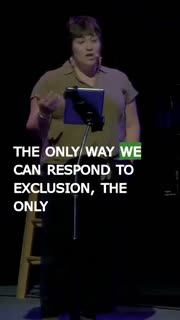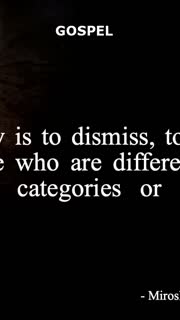Embracing Rejection: Our Identity as Living Stones
Summary
### Summary
Good morning, Covenant family. Today, we delved into the theme of rejection as we explored 1 Peter chapter 2. Rejection is a universal experience, and recent studies even show that our brains process social rejection similarly to physical pain. This aversion to rejection is growing, especially among younger generations, affecting various aspects of life, including dating and personal aspirations. However, rejection is not a new phenomenon; it has always been a part of human experience, and it is deeply embedded in our culture and even within the church.
Peter's letter to the exiled Christians in Asia Minor offers a transformative perspective on rejection through the lens of Jesus Christ. Peter reminds us that while we may feel like exiles, disconnected and rejected, we are also chosen by God. Jesus, the living stone, was rejected by men but chosen and precious to God. This duality of rejection and chosenness is central to our identity as Christians. We, too, are living stones, being built into a spiritual house, a holy priesthood, to offer spiritual sacrifices acceptable to God through Jesus Christ.
Peter emphasizes that our collective identity as God's people helps us overcome rejection. Together, we form a spiritual house and a holy priesthood, bound by our connection to God and each other. This connection is not just social but deeply spiritual and transformative. Through Jesus, we are called to embrace rather than exclude, to build up rather than tear down. This embrace extends to all, even those who have rejected us, as a reflection of Christ's love and sacrifice.
Miroslav Volf's work, "Exclusion and Embrace," further illuminates this concept. Volf, who experienced profound rejection and suffering, concluded that the only way to respond to exclusion is through embrace. This embrace is not an endorsement of wrongdoing but a transformative act of love that mirrors Christ's embrace of us. As we partake in the Eucharist today, let us remember that we are living stones, reflections of Jesus, being built into something sacred and transformational for the world.
### Key Takeaways
1. Rejection and Pain: Rejection is a universal experience that our brains process similarly to physical pain. This aversion to rejection is growing, especially among younger generations, affecting various aspects of life, including dating and personal aspirations. Understanding this can help us empathize with others and recognize the deep impact rejection has on our lives. [19:19]
2. Jesus as the Living Stone: Jesus, the living stone, was rejected by men but chosen and precious to God. This duality of rejection and chosenness is central to our identity as Christians. We, too, are living stones, being built into a spiritual house, a holy priesthood, to offer spiritual sacrifices acceptable to God through Jesus Christ. [27:24]
3. Collective Identity: Our collective identity as God's people helps us overcome rejection. Together, we form a spiritual house and a holy priesthood, bound by our connection to God and each other. This connection is not just social but deeply spiritual and transformative. [31:24]
4. Embrace Over Exclusion: Miroslav Volf's work, "Exclusion and Embrace," teaches us that the only way to respond to exclusion is through embrace. This embrace is not an endorsement of wrongdoing but a transformative act of love that mirrors Christ's embrace of us. [42:42]
5. Transformational Community: As living stones, we are being built into something sacred and transformational for the world. Our connection to God and each other enables us to overcome rejection and become a spiritual house and a holy priesthood, offering spiritual sacrifices acceptable to God through Jesus Christ. [45:58]
### YouTube Chapters
[0:00] - Welcome
[19:19] - Rejection and Pain
[20:18] - The Weight of Rejection
[21:08] - Gen Z and Rejection
[22:13] - Cultural Trends in Rejection
[23:11] - Defining Ourselves by Exclusion
[23:51] - Coping with Rejection
[24:42] - Peter's Perspective on Rejection
[25:38] - Exile and Rejection
[26:23] - Jesus, the Living Stone
[27:24] - Strength and Life in Jesus
[28:18] - Jesus' Rejection and Chosenness
[29:43] - Our Identity as Living Stones
[30:32] - Overcoming Rejection
[31:24] - Collective Identity
[32:23] - Connection and Transformation
[33:21] - Embrace Over Exclusion
[34:07] - Jesus as the Cornerstone
[35:23] - Rejection and Shame
[36:37] - Belief and Unbelief
[37:50] - Chosen People
[38:57] - Critique of Imperial Temples
[39:33] - Proclaiming the Good News
[40:12] - The Journey of Rejection
[40:50] - God's People and Mercy
[41:26] - The Difference of Being God's People
[42:00] - Miroslav Volf's Insights
[42:42] - Embrace as a Response
[43:22] - The Challenge of Embrace
[44:53] - Overcoming Rejection through Christ
[45:58] - Living Stones and Transformation
[46:47] - Conclusion and Eucharist Invitation
Study Guide
### Bible Study Discussion Guide
#### Bible Reading
1 Peter 2:4-10 (NIV)
> "As you come to him, the living Stone—rejected by humans but chosen by God and precious to him—you also, like living stones, are being built into a spiritual house to be a holy priesthood, offering spiritual sacrifices acceptable to God through Jesus Christ. For in Scripture it says: 'See, I lay a stone in Zion, a chosen and precious cornerstone, and the one who trusts in him will never be put to shame.' Now to you who believe, this stone is precious. But to those who do not believe, 'The stone the builders rejected has become the cornerstone,' and, 'A stone that causes people to stumble and a rock that makes them fall.' They stumble because they disobey the message—which is also what they were destined for. But you are a chosen people, a royal priesthood, a holy nation, God’s special possession, that you may declare the praises of him who called you out of darkness into his wonderful light. Once you were not a people, but now you are the people of God; once you had not received mercy, but now you have received mercy."
#### Observation Questions
1. What does Peter mean when he refers to Jesus as the "living Stone"? How does this imagery contrast with a lifeless stone? [27:24]
2. According to 1 Peter 2:4-10, what are the characteristics and roles of believers as "living stones"? [29:43]
3. How does Peter describe the duality of Jesus being both rejected by men and chosen by God? [28:46]
4. What does Peter say about the collective identity of believers and how it helps them overcome rejection? [31:24]
#### Interpretation Questions
1. How does understanding rejection as a universal experience that our brains process similarly to physical pain help us empathize with others? [19:19]
2. In what ways does Peter's description of believers as a "holy priesthood" and "spiritual house" challenge our individualistic culture? [29:43]
3. How does Miroslav Volf's concept of "embrace over exclusion" reflect the teachings of Jesus and the message of 1 Peter 2? [42:42]
4. What does it mean for believers to be "chosen people" and "God's special possession," and how should this identity impact their daily lives? [37:50]
#### Application Questions
1. Reflect on a time when you felt the weight of rejection. How did it affect you, and how can understanding Jesus' rejection and chosenness help you cope with similar experiences in the future? [20:18]
2. Peter emphasizes the importance of collective identity and connection among believers. How can you contribute to building a stronger sense of community within your church or small group? [31:24]
3. Miroslav Volf suggests that the only way to respond to exclusion is through embrace. Think of someone you have excluded or felt excluded by. What steps can you take to offer or receive an embrace in that relationship? [42:42]
4. How can you live out your identity as a "living stone" and part of a "holy priesthood" in your workplace, school, or community? What specific actions can you take to reflect Christ's love and sacrifice? [29:43]
5. Peter calls believers to offer "spiritual sacrifices acceptable to God through Jesus Christ." What are some practical ways you can offer spiritual sacrifices in your daily life? [29:43]
6. How does the concept of being "God's special possession" change the way you view yourself and others? How can this understanding influence your interactions and relationships? [37:50]
7. Reflect on the idea that rejection and exclusion are part of the human experience, but through Jesus, we are called to embrace and build up. How can you apply this principle in a specific situation you are currently facing? [33:21]
Devotional
Day 1: The Pain of Rejection
Rejection is a universal experience that our brains process similarly to physical pain. This aversion to rejection is growing, especially among younger generations, affecting various aspects of life, including dating and personal aspirations. Understanding this can help us empathize with others and recognize the deep impact rejection has on our lives. Rejection can make us feel isolated and unworthy, but it is important to remember that it is a common human experience. By acknowledging the pain of rejection, we can begin to heal and support others who are going through similar experiences. [19:19]
Psalm 34:18 (ESV): "The Lord is near to the brokenhearted and saves the crushed in spirit."
Reflection: Think of a recent experience where you felt rejected. How did it affect you emotionally and spiritually? Can you ask God to help you heal from this pain and to give you empathy for others who are experiencing rejection?
Day 2: Jesus, the Living Stone
Jesus, the living stone, was rejected by men but chosen and precious to God. This duality of rejection and chosenness is central to our identity as Christians. We, too, are living stones, being built into a spiritual house, a holy priesthood, to offer spiritual sacrifices acceptable to God through Jesus Christ. Just as Jesus was rejected, we may also face rejection in our lives. However, we can find strength and purpose in knowing that we are chosen by God and precious in His sight. Our identity is not defined by the rejection of others but by our chosenness in Christ. [27:24]
1 Peter 2:4-5 (ESV): "As you come to him, a living stone rejected by men but in the sight of God chosen and precious, you yourselves like living stones are being built up as a spiritual house, to be a holy priesthood, to offer spiritual sacrifices acceptable to God through Jesus Christ."
Reflection: Reflect on a time when you felt rejected but later realized it was part of God's plan for you. How does knowing that you are chosen and precious to God change your perspective on rejection?
Day 3: Our Collective Identity
Our collective identity as God's people helps us overcome rejection. Together, we form a spiritual house and a holy priesthood, bound by our connection to God and each other. This connection is not just social but deeply spiritual and transformative. As a community of believers, we support and uplift one another, helping each other to overcome the pain of rejection. By embracing our collective identity, we can find strength and encouragement in our shared faith and purpose. [31:24]
Ephesians 2:19-22 (ESV): "So then you are no longer strangers and aliens, but you are fellow citizens with the saints and members of the household of God, built on the foundation of the apostles and prophets, Christ Jesus himself being the cornerstone, in whom the whole structure, being joined together, grows into a holy temple in the Lord. In him you also are being built together into a dwelling place for God by the Spirit."
Reflection: How can you contribute to building up your spiritual community? What steps can you take to strengthen your connection with fellow believers and support those who may be feeling rejected?
Day 4: Embrace Over Exclusion
Miroslav Volf's work, "Exclusion and Embrace," teaches us that the only way to respond to exclusion is through embrace. This embrace is not an endorsement of wrongdoing but a transformative act of love that mirrors Christ's embrace of us. Embracing those who have rejected us can be challenging, but it is a powerful way to demonstrate Christ's love and forgiveness. By choosing to embrace rather than exclude, we can break the cycle of rejection and create a more loving and inclusive community. [42:42]
Romans 12:20-21 (ESV): "To the contrary, 'if your enemy is hungry, feed him; if he is thirsty, give him something to drink; for by so doing you will heap burning coals on his head.' Do not be overcome by evil, but overcome evil with good."
Reflection: Think of someone who has rejected or hurt you. How can you extend an embrace of love and forgiveness to them, reflecting Christ's love in your actions?
Day 5: Transformational Community
As living stones, we are being built into something sacred and transformational for the world. Our connection to God and each other enables us to overcome rejection and become a spiritual house and a holy priesthood, offering spiritual sacrifices acceptable to God through Jesus Christ. By embracing our role as living stones, we can create a community that reflects God's love and grace, transforming the world around us. Our collective efforts can bring about positive change and demonstrate the power of God's love in action. [45:58]
1 Corinthians 3:16-17 (ESV): "Do you not know that you are God's temple and that God's Spirit dwells in you? If anyone destroys God's temple, God will destroy him. For God's temple is holy, and you are that temple."
Reflection: How can you actively participate in building a transformational community within your church and beyond? What specific actions can you take to reflect God's love and grace in your daily interactions with others?
Quotes
### Quotes for outreach
1. "What Peter's letter helps us to consider is the way that rejection through the lens of Jesus Christ can be different than the rejection that you and I have known in the Bible. And that is the way that we have been experienced and sort of either tried to forget or lived and feeling stuck in." [24:42] (13 seconds)
2. "The Jesus that we follow is one who was rejected and chosen. The God who sets forth this order that we live into is one who walks us through rejection and affirmation and building us up. Right? And so though rejected and despised, Jesus is fully alive, fully at work in us and fully at work in the world." [28:46] (21 seconds)
3. "Through the person of Jesus Christ, we are being built into something significant. Not significant like famous and powerful, but something sacred, something spiritual for the world, for the good of the world." [30:32] (12 seconds)
4. "The scripture says that Jesus was and is the cornerstone of our faith, the foundational piece upon which we can build our lives, and our future, and our faith, and the fullness of who we are." [34:07] (12 seconds)
5. "The only way we can respond to exclusion, the only way we can deal with rejection is through embrace. I mean, I'm like, is it that simple? This is like the 10 second hug thing where they say like, if you go 20 seconds, it's like so much better for you. Like the only way to respond to the weight of rejection is to lean in and to love more." [43:22] (24 seconds)
### Quotes for members
1. "Peter moves us from being the exiled people of God to God's people who are chosen. That's what happens in chapter two. He doesn't start with us and how good we are. He doesn't start with us and how wonderful you are. He doesn't start with us and how much suffering we've endured. He starts with Jesus." [25:38] (16 seconds)
2. "Together we are the spiritual house. Together we are the holy priesthood. And so maybe not a lot can happen with one person's experience or another's, but when we gather not only our strengths and our talents and our gifts, but our burdens and our brokenness, God continues to bind us together, build us up to something, again, sacred, something spiritual, something transformational for the world." [32:23] (22 seconds)
3. "Once you were not a people, but you are God's people. Once you had not received mercy, it doesn't matter how many times, how many places, how many ways you were feeling disconnected, cut out, cut off, or far from God. Now you have received mercy again and again, we, the people of God are receiving the mercy that we may or may not be worthy of." [40:50] (28 seconds)
4. "The call of the gospel is to embrace the others as Christ has embraced us, because by embracing each other, we are transformed. We are transformed, and others can be transformed as well." [44:53] (14 seconds)
5. "I pray today that as you pray with a prayer partner, as you light a candle at one of these stations, that you will ask the Holy Spirit to help you. I pray that you will find the ability to reconnect with and embrace other people as the children of God, the people of God." [45:58] (14 seconds)










